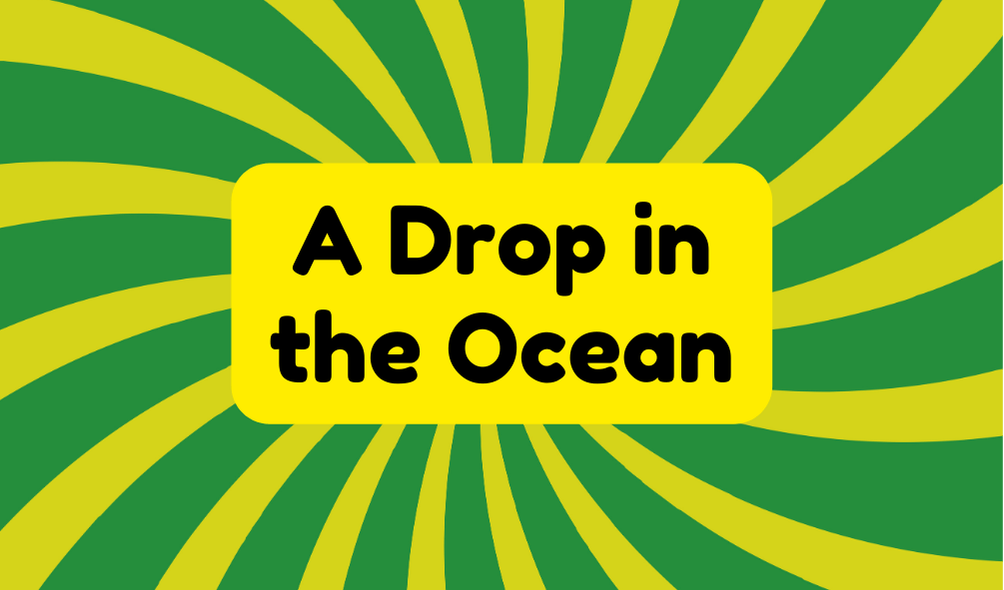The phrase "a drop in the ocean" refers to the insignificance of a small part compared to a much larger whole. This metaphor highlights how minor contributions can feel futile when confronted with significant challenges. Its origins trace back to biblical references, especially Isaiah 40:15. Examples include comments on donations or efforts against vast needs. Today, it serves as a reminder of the limitations of individual actions in addressing global issues, inviting further exploration of its implications.
Synonyms
When considering the phrase "a drop in the ocean," it is important to note that it has several synonyms that capture its essence. These similar phrases often highlight the insignificance of a small part compared to a larger whole, prompting reflection on their contextual usage. The expressions include:
- A drop in the bucket
- A drop in the sea
- A drop in the river
These alternatives serve as thoughtful reminders that, while minor contributions may seem valuable on their own, they often pale in comparison to the significant challenges faced in broader contexts.
Example of Sentences
The phrases that serve as synonyms for "a drop in the ocean" illustrate the notion of insignificance in the grand scheme of things. The usage context sheds light on how futile efforts may seem compared to larger challenges. Comparative references reinforce this sentiment, emphasizing the disparity between a small contribution and a vast need. Consider these examples:
- Her donation was a mere drop in the bucket against the charity's goals.
- The team's effort felt like a drop in the river amidst the overwhelming issues.
- Their influence was just a drop in the sea of public opinion.
Each sentence captures the essence of the phrase's meaning.
Origin
Although many might consider the phrase "a drop in the ocean" to be a simple expression of insignificance, its origins reveal a deeper, more profound historical context. This phrase is rooted in biblical references, specifically Isaiah 40:15, where nations are likened to "a drop in the bucket." First appearing in John Wycliffe's Middle English Bible translation between 1382 and 1395, it has since evolved. Its early use also includes George Washington, who referenced it in his writings. Consequently, the phrase serves not only as a metaphorical commentary on the insignificance of individual actions but also reflects historical perspectives on value and impact.
Collocations
With a rich origin steeped in historical and biblical context, the phrase "a drop in the ocean" naturally lends itself to various collocations that enhance its meaning and usage. These collocations with "drop" and phrases related to "ocean" underscore the phrase's implications, particularly in discussions of scale and significance. Significant collocations include:
- A drop in the bucket
- A drop in the sea
- A drop in the river
Each variant expands upon the original meaning, often emphasizing the contrast between what is offered and the overwhelming need, revealing an unsettling reality about the insufficiency of efforts or resources.
How to Use in Everyday Language
When discussing contributions or efforts in any context, phrases like "a drop in the ocean" can effectively illustrate the magnitude of the situation. This idiom serves as a conversation starter, sparking introspection about practical applications in various fields. Below is a concise representation of how it can be applied:
| Situations | Examples |
|---|---|
| Charity Contributions | "It feels like my donation is just a drop in the ocean." |
| Environmental Efforts | "Every recycling effort seems like a drop in the bucket compared to global waste." |
| Education Initiatives | "Education funding is a drop in the ocean considering the needs of all students." |
Using this phrase can provoke critical discussions about the effectiveness of efforts—or the lack thereof.
Why Is It Still Relevant Today?
Why does the phrase "a drop in the ocean" continue to resonate in contemporary discussions? Its relevance stems from ongoing debates about social impact and the scale of solutions in our modern world. As individuals and organizations endeavor to tackle global issues—like climate change and poverty—small efforts often seem trivial by comparison. This phrase serves as a reminder of the disproportionate challenges we face, inviting critical reflection on the effectiveness of collective actions. It prompts society to reassess the significance of each contribution, urging participants to contemplate whether their efforts truly make a meaningful difference or remain just a drop in an expansive ocean.







